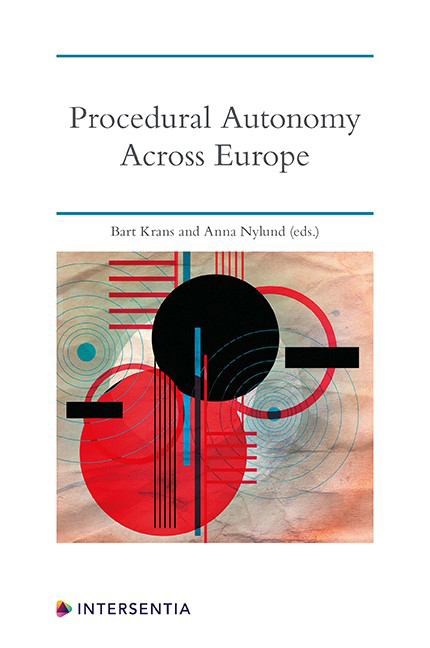Book contents
- Frontmatter
- Preface
- Contents
- Table of Cases
- List of Authors
- Aspects of Procedural Autonomy
- Procedural Autonomy and Belgian Civil Procedure Law: A Turbulent Cohabitation
- The English Approach to Procedural Autonomy
- The Finnish Way of Understanding Procedural Autonomy: A Practical Approach to Implementing EU Civil Procedural Law
- A German Perspective on the Waning Procedural Autonomy in Civil Matters: Who is Afraid of European Civil Procedure?
- Procedural Autonomy in the Netherlands: A Fading Relic?
- Procedural Autonomy, the EEA Agreement and Norwegian Law: The Art of Bridging a Gap and Maintaining it Too
- A Polish Perspective on Collective Civil Proceedings: Reluctance to Follow EU Recommendations?
- Procedural Autonomy between EU Law and the Slovenian Law of Civil Procedure
- Autonomy of the Spanish Legislator in the Regulation of Procedural Law: The Borders of European Case Law
- Procedural Autonomy in Sweden: Is Materielle Prozessleitung the Answer?
- Comparative Insights on Procedural Autonomy
- Index
- ABOUT THE EDITORS
Procedural Autonomy in the Netherlands: A Fading Relic?
Published online by Cambridge University Press: 30 April 2020
- Frontmatter
- Preface
- Contents
- Table of Cases
- List of Authors
- Aspects of Procedural Autonomy
- Procedural Autonomy and Belgian Civil Procedure Law: A Turbulent Cohabitation
- The English Approach to Procedural Autonomy
- The Finnish Way of Understanding Procedural Autonomy: A Practical Approach to Implementing EU Civil Procedural Law
- A German Perspective on the Waning Procedural Autonomy in Civil Matters: Who is Afraid of European Civil Procedure?
- Procedural Autonomy in the Netherlands: A Fading Relic?
- Procedural Autonomy, the EEA Agreement and Norwegian Law: The Art of Bridging a Gap and Maintaining it Too
- A Polish Perspective on Collective Civil Proceedings: Reluctance to Follow EU Recommendations?
- Procedural Autonomy between EU Law and the Slovenian Law of Civil Procedure
- Autonomy of the Spanish Legislator in the Regulation of Procedural Law: The Borders of European Case Law
- Procedural Autonomy in Sweden: Is Materielle Prozessleitung the Answer?
- Comparative Insights on Procedural Autonomy
- Index
- ABOUT THE EDITORS
Summary
A FIRM STARTING POINT IN EU LAW
The relationship between EU law and national civil procedure law is developing quite rapidly. That might be considered as surprising because the starting point is clear and simple: EU law is law of the EU and the rules and regulations concerning civil procedure are up to the Member States. Member States have the authority over their own procedural system. This outset from the start also means that proceedings concerning EU law before national courts are conducted along the lines set out by the national civil procedure system. There is no EU law that provides a general system for all types of civil cases that must be applied by Member States. EU Member States are free to set up their own system concerning civil procedural law.
That has been settled case law for many years. In the classic case Rewe from 1976, the ECJ placed emphasis on the concept of procedural autonomy. In many cases since then the ECJ has referred to this starting point. In the EOS/Danko case from September 2018 the question at the table was whether Directive 93/13 on unfair terms precludes certain national legislation which prevents a consumer protection organisation from intervening in proceedings seeking an order for payment. On its way to the answer the ECJ ruled that in the absence of EU legislation concerning the possibility for consumer protection associations to intervene in individual disputes involving consumers, it is for the national legal order of each Member State to establish such rules, in accordance with the principle of procedural autonomy. By doing so, the ECJ once again reconfirmed the principle of procedural autonomy. There are many more cases in which the ECJ has referred to this starting point.
By the term ‘procedural autonomy’, only the freedom of the Member States to organise their procedural law for civil proceedings is referred to. Nevertheless, it is worth mentioning that procedural autonomy is not the only type of autonomy that plays a role in the ECJ case law. For example, in several combined cases on possible state aid and tax measures adopted by a regional or local authority the ECJ also refers to the concept of institutional autonomy, economic autonomy and regional autonomy. This chapter deals with procedural autonomy of the Netherlands.
- Type
- Chapter
- Information
- Procedural Autonomy Across Europe , pp. 101 - 118Publisher: IntersentiaPrint publication year: 2020
- 1
- Cited by



